The Reign of King Henry IV
from The Chronica Maiora 1376–1422
Published online by Cambridge University Press: 24 October 2017
Summary
The holy oil used at the coronation of Henry IV
On the feast of the translation of St Edward, king and confessor [13 October], King Henry IV was crowned atWestminster by the hands of Thomas [Arundel], archbishop of Canterbury, this being the very day on which a year ago he had been banished into exile.1 This, so men thought, could not have happened without a divine miracle. And as an auspice of what was believed would be a richer grace for him in the future, he was anointed with that heavenly oil, which once the blessed Mary, mother of God, entrusted to the blessed Thomas [Becket], martyr and archbishop of Canterbury, while he was in exile, prophesying to him that the kings of England who were anointed with this oil would be champions of the church and men of benevolence. For long ages it had lain hid, preserved in a golden eagle with its stone flask, but at last it had been miraculously brought into the light of day, when Lord Henry, first duke of Lancaster, was fighting the wars of his king in lands across the sea.2 For the eagle had been given to him personally by a holy man, who had found it by divine revelation. The duke gave it to the noble Prince Edward [the Black Prince], the eldest son of the illustrious Edward [III], king of England, so that after the death of his father he might be anointed as king with this oil. The prince put the oil in the Tower of London, storing it in a chest secured by many padlocks. And there it remained hidden, either through forgetfulness or through neglect, right until the time of King Richard, son of the noble Prince Edward.
In 1399 King Richard had been curiously examining the objects left to him by his ancestors, and had unexpectedly come across the eagle with its flask, together with a writing or prophecy of the blessed martyr Thomas, and learning of the great virtue possessed by the oil, he asked Thomas [Arundel], archbishop of Canterbury, to anoint him a second time with this oil.
- Type
- Chapter
- Information
- The Chronica Maiora of Thomas Walsingham (1376–1422) , pp. 312 - 388Publisher: Boydell & BrewerPrint publication year: 2005

